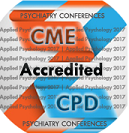
Yuping Cao and Yalin Zhang
Central South University, China
Title: A national survey on the professional backgrounds of the practitioners of psychocounseling and psychotherapy in China
Biography
Biography: Yuping Cao and Yalin Zhang
Abstract
Statement of the Problem: The psycho-counseling and psychotherapy have been developed in China since two decades, and the practitioners are growing. However, these practitioners’ professional backgrounds have not been well studied previously. This paper is set to explore their professional backgrounds nationwide in China.
Methods: It was a cross-sectional nationwide survey. Multi-stage sampling by regions and cities combined with cross-control quota sampling by disciplines was used, and then face-to-face interview was conducted. According to the administrative divisions by Chinese government, the whole China was divided into 6 regions. In each region, the sampling cities were divided into 3 city-level. And the sampling disciplines included three, which were health-care system, educational system and other department practitioners. A quota sample of 200 practitioners was selected from each region. Each discipline covered one third of sampling both in each region and each city-level.
Findings: A total of 1232 practitioners were interviewed face-to-face. 70.4% was female and 29.6% was male. The mean age was 37.0±8.4 years (range from 21 to 80 years). As to educational level, 68.8% of all the practitioners were with undergraduate degree, 31.0% with graduate or postgraduate degree, only 0.2% with high school level. As to professional background, 49.6% of the practitioners were with psychology, 36.0% with medicine, 17.5% with pedagogics, and 25% with other background such as law, finance, engineering, management, Chinese literature, nursing, IT, chemical, trading, tourism science, agriculture, sociology and nutriology, et al. Among non-psychologists, 61.7% of the practitioners learned psychological knowledge from the training class, 22.2% learned from the conference, 39.6% from refresher course, 27.7% from the supervisor, 19.6% from web-based training, and 51.4% learned by themselves.
Conclusion & Significance: Although the educational level of the practitioners of psycho-counseling and psychotherapy in China is not low, less than half of them were with background of psychology, and more than half of them learned by themselves. It suggested that the practitioners of psycho-counseling and psychotherapy in China need more normalized guideline and training.

